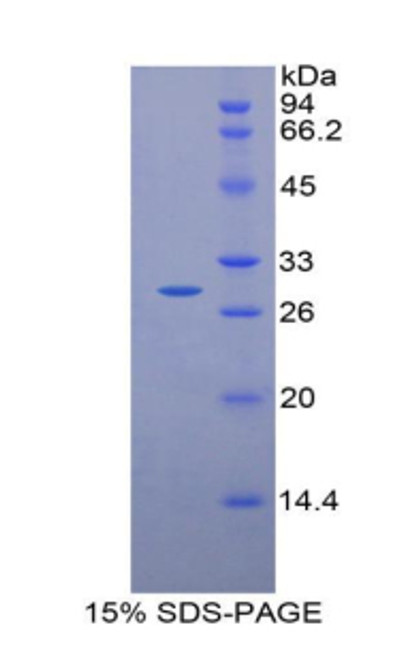Product Description
Human Dual specificity protein kinase TTK (TTK) ELISA Kit | KTE60118 | Abbkine
Application: This Human Dual specificity protein kinase TTK (TTK) ELISA Kit employs a two-site sandwich ELISA to quantitate TTK in samples. An antibody specific for TTK has been pre-coated onto a microplate. Standards and samples are pipetted into the wells and anyTTK present is bound by the immobilized antibody. After removing any unbound substances, a biotin-conjugated antibody specific for TTK is added to the wells. After washing, Streptavidin conjugated Horseradish Peroxidase (HRP) is added to the wells. Following a wash to remove any unbound avidin-enzyme reagent, a substrate solution is added to the wells and color develops in proportion to the amount of TTK bound in the initial step. The color development is stopped and the intensity of the color is measured.
Detection Method: Colorimetric
Conjugate: N/A
Sample Type: Cell culture supernatants#Serum#Plasma#Other biological fluids
Assay Type: Multiple steps standard sandwich ELISA assay with a working time of 3-5 hours. It depends on the experience of the operation person.
Kit Component: • Human Dual specificity protein kinase TTK microplate
• Human Dual specificity protein kinase TTK standard
• Human Dual specificity protein kinase TTK detect antibody
• Streptavidin-HRP
• Standard diluent
• Assay buffer
• HRP substrate
• Stop solution
• Wash buffer
• Plate covers
Features & Benefits: Human Dual specificity protein kinase TTK (TTK) ELISA Kit has high sensitivity and excellent specificity for detection of Human TTK. No significant cross-reactivity or interference between Human TTK and analogues was observed.
Calibration Range: Please inquire
Limit Of Detection: Please inquire
Usage Note: • Do not mix components from different kit lots or use reagents beyond the kit expiration date.
• Allow all reagents to warm to room temperature for at least 30 minutes before opening.
• Pre-rinse the pipet tip with reagent, use fresh pipet tips for each sample, standard and reagent to avoid contamination.
• Unused wells must be kept desiccated at 4 °C in the sealed bag provided.
• Mix Thoroughly is very important for the result. It is recommended using low frequency oscillator or slight hand shaking every 10 minutes.
• It is recommended that all samples and standards be assayed in duplicate or triplicate.
Storage Instruction: The unopened kit should be stored at 2 - 8°C. After opening, please store refer to protocols.
Shipping: Gel pack with blue ice.
Precaution The product listed herein is for research use only and is not intended for use in human or clinical diagnosis. Suggested applications of our products are not recommendations to use our products in violation of any patent or as a license. We cannot be responsible for patent infringements or other violations that may occur with the use of this product.
Background: This au protein kinase belongs to the family of transferases, specifically those transferring a phosphate group to the sidechain oxygen atom of serine or threonine residues in proteins.This enzyme participates in 14 metabolic pathways: erbb signaling pathway, cell cycle, wnt signaling pathway, hedgehog signaling pathway, axon guidance, focal adhesion, b cell receptor signaling pathway, insulin signaling pathway, melanogenesis, alzheimer's disease, colorectal cancer, endometrial cancer, prostate cancer, and basal cell carcinoma.Expressed in the brain, particularly in cortical and hippocampal neurons. Weakly expressed in spinal cord and testis. No expression in adipose tissue, bladder, cervix, colon, esophagus, heart, kidney, liver, lung, ovary, placenta, prostate, skeletal muscle, small intestine, spleen, testis, thymus, thyroid or trachea.
Alternative Names: TTK; CT96; ESK; FLJ38280; MPS1; MPS1L1; PYT; cancer/testis antigen 96; dual specificity protein kinase; monopolar spindle 1-like 1; phosphotyrosine picked threonine kinase
Search name: TTK; CT96; ESK; FLJ38280; MPS1; MPS1L1; PYT; cancer/testis antigen 96; dual specificity protein kinase; monopolar spindle 1-like 1; phosphotyrosine picked threonine kinase
Tag: TTK
 Euro
Euro
 USD
USD
 British Pound
British Pound
 NULL
NULL












